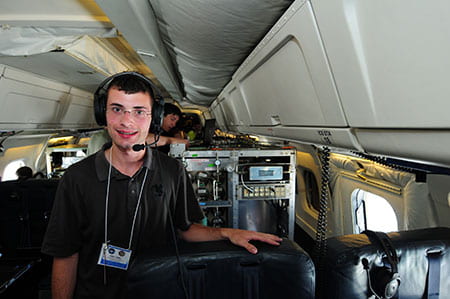Eric Lebel ’15 to present NASA research at national conference
By Genevieve Garry ’18
Providence College student Eric Lebel ’15 (Queensbury, N.Y.), who was chosen for the prestigious NASA Student Airborne Research Program last summer, will present his research during the American Geophysical Union Fall Meeting on Dec. 15-19 in San Francisco, Calif.
A biochemistry and music double major, Lebel was one of 32 rising college seniors selected through a nationwide application process to do hands-on research in an airborne science campaign aboard NASA’s DC-8 aircraft. Research areas include atmospheric chemistry, air quality, forest ecology, and ocean biology. In addition to a stipend, travel and living expenses for the eight-week program were paid by NASA.

Lebel spent the first week of the program at NASA’s Armstrong Flight Research Center in Palmdale, Calif., where he listened to lectures given by professors and NASA scientists on topics ranging from climate change to NASA’s role in airborne science campaigns.
Lebel and the other students then integrated the instruments onto the DC-8 aircraft and helped prepare for the research flights. The following week, five research flights were conducted, where the students assisted the scientists onboard in the collection of data, taking air samples and spectral data from around the state of California.
The students were split into four teams that focused on different aspects of an airborne campaign such as remote sensing of forests and oceans and real-time measurements of aerosols and harmful gases such as ozone, carbon dioxide, and carbon monoxide. Lebel was a member of the Whole Air Sampling group, which collected air samples during the research flights and stored them in canisters for later analysis.
During the remaining six weeks of the program, he moved to the University of California, Irvine, where he worked with graduate students in the Rowland-Blake Laboratory to measure the concentrations of dozens of trace gases in these air samples. The students then analyzed the data they collected and gave a 12-minute presentation for their peers and NASA officials during the final week of the program.
Lebel’s project specifically focused on dimethyl sulfide concentrations, a gas usually found in marine environments.
“I focused on dimethyl sulfide possibly being emitted from agricultural sources in the Central Valley of California, which can contribute to increased aerosol loadings and poor air quality in this region,” he said.
Lebel will be one of 24,000 attendees to participate in the largest earth and space science meeting in the world at the 47th annual American Geophysical Union Fall Meeting.
Music is in his blood, too
In addition to his extensive research, Lebel is an accomplished musician. As a music major, his primary instrument is the pipe organ. Additionally, he is a member of I Cantori, the auditioned choral ensemble at PC, and the director of Schola Cantorum, the liturgical ensemble which provides music at the 4:30 p.m. Mass every Sunday in St. Dominic Chapel.
“He’s very bright and works very hard. Since he is a double major, his time-management skills are very good,” said Dr. Kathleen A. Cornely, professor of chemistry and one of Lebel’s mentors.
Lebel started taking piano lessons at 11 years old and became interested in the organ in high school.
“The church where I took piano lessons had a very large instrument and after I had the opportunity to try it, I was hooked,” he said.
Similarly, Lebel said he is “hooked” on research and appreciates the expertise of and access to faculty at PC.
“It’s great that we have the opportunity to work with professors directly in conducting research. If you want to do research, there’s usually someone doing a project that will interest you,” said Lebel.





